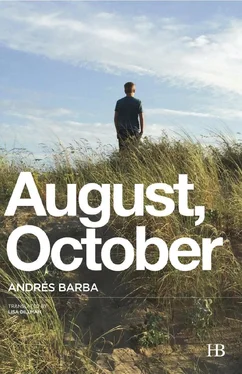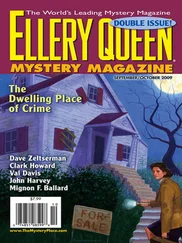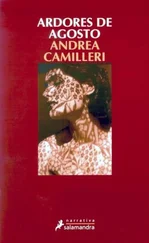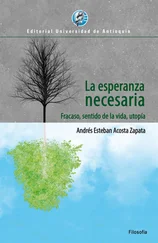“I can’t sleep. I’m scared.”
“What are you scared of?”
“Aunt Eli.”
Her arms were like very thin cotton, hanging lifelessly on either side of a white dress she’d probably never wear again, because, despite her age, Anita had already developed an inexplicably precise set of superstitions. His father requested they open the coffin one last time as Aunt Eli was taken from the funeral home, and her face appeared — all of them gathered around as though staring down into a well — Aunt Eli’s face there like a fat sunflower, pale and spongy. He thought then, for the first time, This is real; she’s dead .
The coffin was pretty, lacquered in creamy brown, like a giant bonbon. As it was lowered from the hearse, everyone crowded around to help, though it turned out not to be necessary, both because it was on wheels and because the hearse drivers themselves carried it to the nave inside the cemetery’s small church. They worked with such efficiency, using such a strange device — with little, fold-down wheels — that for a few seconds everyone was more mesmerized by the men and what they were doing than by the coffin.
As the deer thirsts for water, Lord, so my soul longs after Thee. My soul thirsts after the living God. When shall I come and appear before God ? He could detect the vibration of each word, but he’d been stripped of emotion. It had started yesterday. A feeling he got the sense only Anita shared. During the funeral procession, in the car on the way to the cemetery, he gave Anita his hand. The front row of the funeral party had an introspective and slightly anarchic air, while the back row, where Aunt Eli’s friends were, showed more of a sense of imposed solemnity. The priest walked behind the coffin wearing a professional expression. The cemetery opened out on both sides and everyone was glancing around at the graves a bit distractedly. He could see himself watching, see himself there among all those props as though backstage, on a set. He watched himself, as if he were experiencing Aunt Eli’s death, as if the death of Aunt Eli were real and true one second and then so fake the next that she required the whole ridiculous performance they were putting on, and then true once more, but with no real emotion behind it. It was as if someone who didn’t belong had just burst in and interrupted a dance, and they’d all stopped and were waiting for somebody else to come and explain the reason for the interruption, but no one did, and the dance simply ended, and that was it. That was the way the dance ended.
“We deliver you, dear sister Eli, to almighty God, we deliver you unto Him who created you, that you may return to God, who formed you from the dust of the earth.”
The wreaths were brought out and laid on top of the coffin, but they wouldn’t fit in the grave and had to be smashed down a little, thereby immediately losing all their dignity. The grave looked, now, like some sort of landfill for flowers.
“Now that your soul has left your body, may the splendid hierarchy of angels come to greet it; may the noble army of martyrs, the triumphant band of confessors attend around you; may the jubilant chorus of virgins hail you; and may you be held fast in the blessings of peace, in the bosom of the patriarchs. May you be a stranger to all that is punished with darkness, with flames, and condemned to torments. May none of the ministers of Satan dare to stop you in your way. May he tremble in your approach in the company of angels. May he with confusion fly away into the vast chaos of the night. Amen.”
“Amen,” they echoed.
The first to throw a handful of dirt was Anita, at Mamá’s urging. Next came his father, his mother, Aunt Eli’s friends, and it was then — when everyone turned to him, to let him through, as he crouched to take a handful from the little mound beside the grave and was about to walk up to the pit — that he felt for the first time since she’d died as if Aunt Eli’s life were flowing solemnly and somberly over them, above their heads, as if she were vanishing into the cemetery air and coiling around the trees, somehow obscured, and as if surprised at herself, or disconnected, like a landscape that by dint of being observed, is transformed. He thought, Here it comes, now I am going to feel sorrow , and he stood quietly, attentive. But sorrow did not come. What came was rage.
He remembered his hands, the feeling his hands produced all afternoon as he packed his bags in silence in a house he’d never again live in, and the abrasive, aching sound of the dunes from the balcony, and the faint, downy contact of his mother’s cheek when she came into his room to give him a kiss. And the day almost seemed to refuse to end — the afternoon went on and on with its vertical, white light. It was white grief, bleak by virtue of its sheer light, and now it opened its big, soft doors. White was the color of death. They hardly spoke all day. In a way, it was as though they had already gone back to living their winter lives, weighed down by obligations, and each of them carried the private burden of their individual problems — problems that go unshared, because they’re trivial, but are still the stuff of everyday existence. Secreted behind closed lips were all the things they’d felt and only very timidly dared to share. Their way of dealing with Aunt Eli’s death said this, that they belonged to one another, that they were alike, but also alone.
That was when he first got the feeling, as he was packing his suitcase. Initially like a vague sort of irritation, one with no real object, and then cold, full of genuine rage — they’d deceived him. Not his parents specifically — all of them. He’d been deceived. He raised a hand and held it out before him; he’d been staring at the thought like a lunatic. Sometimes he felt ashamed not to have seen it sooner. But what was it that he’d seen, exactly? He didn’t know… the deceit. A sort of wind that swept over everything, brushing it all into a corner of the world. He felt a strange urge to be violent, impetuous, voracious, as if something were about to rise up from those effulgent dunes and swallow everything, even him, the way it had Aunt Eli. Summer was over. The next day they’d take the train home, and he’d be back in the city. Was that how it was all going to end? It couldn’t end like that. He texted, Leaving tomorrow meet up tonight , and sent it to Rivero. On his cell phone’s tiny screen, a miniature envelope sealed itself and darted off. Message sent. And ten seconds later, Sure, princess . He felt like getting drunk, and high, like something had grabbed him by one arm and roughly thrust him forward. The way his parents expressed their grief got on his nerves for the next three hours until he went out; it was both mawkish and cautious, an emotion half expressed and half restrained, as though they were horrified at the thought of perhaps being too explicit. His father wept alone for a time, on the balcony, and he watched his back, contracting in rhythmic little spasms, from his bedroom window. Even without seeing his face, he could see the way his lips were turning down, the way his nose was running, the way he was staring off at the dunes — with the same stunned look he’d had at the cemetery — and spilling something soft and warm over them. His own state of mind made him no less uneasy. He saw himself as cold, as though he’d been injected with a virus that inhibited emotional reaction. Actually, he felt nothing, and not feeling anything was a state in and of itself, an uneasiness perceived precisely due to its absence. He remembered it as if something had, for those three hours, been growing — a disposition perhaps — as if something inside him had flipped a lever that enabled certain things to occur, things up to that point only imagined. He remembered, too, that during the course of those hours he felt open contempt for the naïveté with which he’d lived his life up until then and that he sensed what would later turn into the cold courage (because, ironically, the experience of courage was a cold one) of someone determined to be intransigent. He was fascinated by the sentiment; it floated like a soft mist as the afternoon faded away, and it penetrated him — spent — the way Aunt Eli’s dead face had penetrated him when they opened her casket on the way out of the funeral home.
Читать дальше












